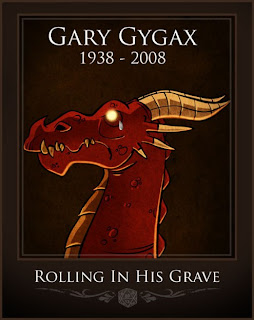Although I'm running the Friday night campaign with the
BoL rules, I'm also using the
Mythic GM Emulator (published by
Word Mill Games). Designed to facilitate GM-less or low-prep play, this product is essentially a
Magic 8-Ball for RPG campaigns: at its core is a Fate Chart that adds a random element to yes/no questions about the campaign setting. There are also rules for random events, and a subsequent supplement (
Mythic Variations) allows for genre and theme-specific modifications to the frequency of those events. All of these systems work like an overlay on whatever set of RPG rules you happen to be using at the time.
I decided to use the
Mythic GM Emulator because I hate game prep. I get "analysis paralysis," and campaigns die shortly after beginning. The
GM Emulator's guidelines for random scene generation (used in conjunction with the logical premises derived from the campaign setup and the players' choices of characters) thus seemed like a way around this problem for me. I would create the first scene of the campaign myself and then let the
GM Emulator guide me the rest of the way.
This plan worked out beautifully in prep and play. After the heroes had accepted Radam Tyl's pitch, they were almost certainly going to go down to the docks of Zalut to hire a ship. Rolling on the Event Focus Table for this scene, I got a result of "Introduce a new NPC." Nothing particularly surprising: I assumed at first that this would be the ship captain. Then I rolled for the event's meaning and received results of "release" and "rumor." Those didn't sound like a ship's captain; instead, the two terms suggested that the heroes were approached by a competitor of Radam Tyl's, an alchemist who had also learned about the new clues to M'lor's location. Thus Sorsha was born. I was even able to generate one of the best images of the session randomly: I rolled on the "Event Meaning" tables to determine the nature of Sorsha's alchemical speciality and got "inquire" and "pain" as results. Interpreting these as indicators of her interest in torture, I invented her poor slaves (and their sewn-shut eyes) on the spot.
The next scene of the session was also randomly determined. This time the Event Focus table generated a result of "PC Negative"—something bad happens to one of the heroes. Event Meaning results of "communication" and "disruption" suggested that, once again, the search for a ship's captain would be interrupted. This time a hero's backstory would be the vehicle of the deferral, and a d4 roll made Daneel my victim. Clearly the sorcerous cheaters he was tracking down had decided it was time to remove the pesky investigator . . . permanently. I turned to the page of the
BoL rulebook providing stats for tough thugs and told the players to roll for initiative. I was particularly pleased by the
GM Emulator in this scene: I came to the table knowing nothing of Brian's plans for Daneel, but the framework for random inspiration provided by the
Emulator allowed me to foreground those plans on the spot.
The third and final scene was "NPC Positive." As a group, we decided that the heroes would finally locate a suitable ship and that said ship's captain would be more than eager to provide the heroes with passage to Parsool. After all, they had more than enough gold from Radam Tyl to convince even the most reluctant captain to let them on board. When I rolled for Event Meaning, I was temporarily stumped by my results of "advice" and "postpone"—I wasn't sure how to interpret these to fit the scene. Irryn's player Tim came to my rescue here, suggesting that Captain Tinray knew a storm was coming but didn't think he needed to mention it to the heroes. With Tim's help, I was able to set up the cliffhanger for the session: the sudden darkening of the sky and an ominous wave rearing up over the deck of the
Screaming Manta.
Consider this post a positive review for the
Mythic GM Emulator, then. I didn't use the Fate Chart all that much or play around with Chaos Factors (an aspect of the system that alters the frequency of yes/no responses), but the Event Focus and Event Meaning tables were pure gold where scene setting was concerned.


